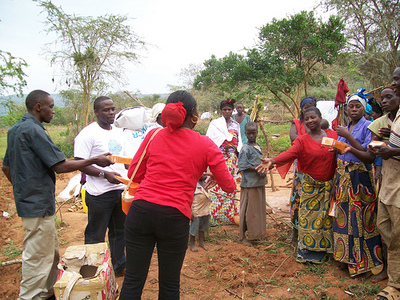Every day of the week, The Pollination Project provides $1000 in seed funding to an individual who is working to make the world -- or just their own community -- a better, more peaceful and more sustainable place.
Since we launched a year ago, we've funded people and projects in 47 countries around the world. (To see a map of where our grantees are located, click here). This week, we added two new projects in Uganda, one in Spain and four in the U.S. Here are the extraordinary people and ideas changing the world this week:
 Papa Emma, a survivor of civil violence in the Congo, has begun a one-year Peace and Youth Transformation Project at the Nakivale Refugee Camp in Uganda. The program promotes mechanisms for peace building among refugees, youths, and women for social transformation including increased self-reliance, health, and education. A former resident of the refugee camp, Papa was trained as a monk, and mastered meditation as means to peace.
Papa Emma, a survivor of civil violence in the Congo, has begun a one-year Peace and Youth Transformation Project at the Nakivale Refugee Camp in Uganda. The program promotes mechanisms for peace building among refugees, youths, and women for social transformation including increased self-reliance, health, and education. A former resident of the refugee camp, Papa was trained as a monk, and mastered meditation as means to peace.
Joseph Mbusa and his colleague Nsimye Juliet are bringing solar power to the Rwenzori region of rural Western Uganda, and educational opportunities for children of the region's Mubuku Vanilla Farmers Association. Farmers in the organization grow vanilla, coffee, and coca on a small scale, and are unable to afford to install a power grid supplying their homes. This program, Light to a Child, is helping children overcome health and learning disadvantages caused by indoor pollution from the use of kerosene and other unsustainable power sources.
Lydia Paar is a writer, university instructor and founder of the Network of Mutual Artistic Development (NOMAD), an online platform linking arts residency "hosts" with a spare room or workspace to creators looking for a peaceful space to create. Lydia's presentation of a worldwide art colony where time and space to work are exchanged, rather than money, is a unique approach and a sustainable template for encouraging the creative arts. Lydia believes people grow by learning to do new things, and, with the space to follow even their strangest ideas to completion, new art forms will be made that reflect the world back to itself through the creator.
Christopher Kennedy, a school teacher, and his wife, biologist Marilyn McHugh, created The Cleveland Seed Bank. Cleveland is home to a growing local food movement, including urban farms, but lacks a local resource to promote, grow, and build a seed saver network. Working with the Cleveland Public Library, The Cleveland Seed Bank will host a number of 'seed libraries' around the city, as well as an extensive social media campaign to educate the public on these resources.
Jody Krankel is the founder of Elgin Alley Cats, a group of volunteers caring for the stray and feral cat population in Elgin, Texas. The team performs TNR (trap, neuter/spay, return), an effective and humane way of controlling cat overpopulation and improving the health and welfare of stray and feral cats. Elgin Alley Cats also helps educate residents of Elgin through brochures, yard sales, and cat adoption events.
Christopher Crump of Galicia, Spain, set aside part of his property to create Freedom Forest, a program to teach visitors about forest gardens, bed growing, woodland crafts, willow fencing, and sustainable lifestyles. Christopher built 28 raised gardening beds, an aquaculture pond, and public education spaces where visitors will learn about organic practices, responsible food choices, and avoiding GMOs.
Shireen Daytona and her neighbors faced rent increases of 45-100 percent when their building in Culver City, Calif. changed ownership. Galvanized into action, Shireen started Culver City Rent Control, a campaign seeking a cap on rent increases, no more than one yearly increase, an end to no-fault evictions, and a provision for tenant relocation fees under certain circumstances such as redevelopment by the landlord. With 45 percent of Culver City's population of 38,000 being renters, Culver City Rent Control is an active grassroots campaign with the potential to create important change and help people maintain roots in the community they love.
Congratulations to our grantees this week for their outstanding work.
These are just a few examples of what a little seed money can do when put in the hands of someone with a vision and a plan to change the world.
We're just beginning our second year of daily giving, a practice we recommend you take on in your own way. You'll understand how the simple practice of daily giving has the power to transform.
The Pollination Project makes $1000 grants every day, 365 days a year to individual changemakers. Please go to our website at www.thepollinationproject.org for funding guidelines and application.
